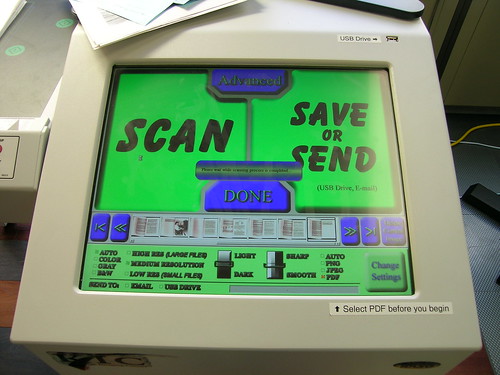Interesting backstory about the timing of the National Library of Ireland’s decision to publish rare James Joyce manuscripts online. Controversial Joyce scholar, Danis Rose is claiming that EU copyright gives one “economic rights” if they are the first to publish public domain materials and is publishing these manuscripts via a US publishing house called House of Breathings. And maybe all libraries with digitized online manuscripts have these sort of warnings, but this collection seems more heavily warned than most, see below.
Tag: digitzation
unintended consequences of Google Books project
I was lucky enough to catch Brewster Kahle talking with Amy Goodman on Democracy Now on my drive home from NJLA. I feel like I’m pretty up on what’s going on with Google and the Internet Archive and book scanning. What I didn’t know is how Google’s agreements with libraries are hindering the IA’s access, not because of the contracts, but just because of differing priorities. The video and transcript are now available online.
AMY GOODMAN: Explain what you mean when you say it’s not legally required. You mean in the contract, what they have with Google? And so, if Google was here, they’d say, “We didn’t say they couldn’t give it to Internet Archive. That’s their prerogative.â€
BREWSTER KAHLE: Correct, that basically Google didn’t put it in their contract. Yet from a library’s perspective, why have a book scanned twice? It’s wear and tear on the books. If they think that—and they wouldn’t have signed it if they didn’t think that the Google thing was a good idea. But now that they’ve signed this with Google, they don’t want it scanned again. And this is a problem, because the books, even the out-of-copyright books, are locked up perpetually.
finger pointing when digital archives disappear
I really enjoyed this article about Google buying up the Paper of Record digital news archives and then “disappearing” it somehow. The timeline is a little unclear and it’s back online for now, but as Google figures out how to monetize it and researchers yowl about lack of access, it raises some pretty interesting issues about scholarship. As information ownership changes hands — and I think if we weren’t talking about Google here we’d be talking about someone else, so it’s not really about them — data can literally disappear either behind a paywall or just gone. Particularly poignant in this case is the comment (sorry no permalink) on the Inside Higher Ed story by Bob Huggins the original founder/creator of the archive discussing what’s happening with the archive now.
When exactly does the cat fight end? It slays me to see the great American Us versus Them debate rage on( I comment as a Canadian). As person who pioneered the digitization of newspapers in the world with our company, Cold North Wind, I fail to see how this acrimony between Academics and Google helps ‘joe public’ access the public record. I have stated on numerous occasions that the newspaper represents ‘our’ only record of daily public life for the past 500 years with a special emphasis on the word “public”… I have been through the grinding wheels of both Google and many public institutions whose goal it seems is to preserve and present history from Newspapers. Both have let me down.
Google’s book people talk to librarians at Midwinter
Library Journal has a thorough article reporting on the panel on the Google Books settlement that happened at Midwinter.
Mitch Freedman, past president of ALA, wondered about changes to the “free to all†ideology of libraries, asking whether Google would permit, as do other databases, site licenses for public libraries. [Google’s Dan] Clancy said that, given the consumer market, there was no agreement on remote access, but that could change down the road. “Authors and publishers were not comfortable with remote access.†While Freedman said that issue was resolved with database publishers, Clancy responded that those publishers don’t have a model aimed at consumers. He noted that “the challenge of selling into this market is not Google’s core competence,†so consortial discounts are authorized in the agreement.
book scanning for patrons

photo originally from akseabird
I’m pretty skeptical when people call anything for sale “revolutionary.” However, a friend sent me this photo which was up on Flickr. It’s a tool called the Bookeye book scanner. It’s a library digitzation product, but if you look at the photo, it’s being used as a tool for the public — or University of Alaska at Anchorage students — to scan documents to PDF, JPG, TIFF or PNG and then save to USB drive, burn them to a CD, ftp them, save them to a network drive or email them to themselves. Their website even has usage stats that shows what people did with the first million pages they scanned. Good data, and it’s broken down by library type which is even more interesting to me, to see the differences in usage patterns. [thanks manuel]

